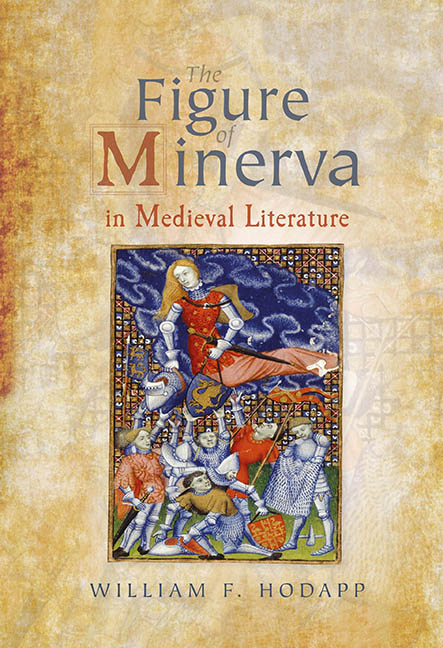Book contents
- Frontmatter
- Dedication
- Contents
- Illustrations
- Acknowledgements
- Abbreviations
- Introduction
- 1 The Roman Minerva and Elements of Medieval Classicism
- 2 The Sapiential Tradition: Minerva as Redemptress
- 3 The Martianus Tradition: Minerva as Mistress of the Liberal Arts
- 4 The Patrona Tradition: Minerva as Protectress and Benefactor
- 5 The Patristic Tradition: Minerva as Idol
- 6 The Ovidian Tradition: Minerva as Venus’ Ally
- Conclusion
- Bibliography
- Index
3 - The Martianus Tradition: Minerva as Mistress of the Liberal Arts
Published online by Cambridge University Press: 17 October 2019
- Frontmatter
- Dedication
- Contents
- Illustrations
- Acknowledgements
- Abbreviations
- Introduction
- 1 The Roman Minerva and Elements of Medieval Classicism
- 2 The Sapiential Tradition: Minerva as Redemptress
- 3 The Martianus Tradition: Minerva as Mistress of the Liberal Arts
- 4 The Patrona Tradition: Minerva as Protectress and Benefactor
- 5 The Patristic Tradition: Minerva as Idol
- 6 The Ovidian Tradition: Minerva as Venus’ Ally
- Conclusion
- Bibliography
- Index
Summary
Closely allied with Minerva-Sapientia, creatrix and redemptress offering a contemplative way to divine wisdom through love, Minerva the educator – magistra artium, the mistress of learning and skill – plays a central role in the liberal arts tradition of the Middle Ages. Medieval scholars and poets, largely through the influence of Martianus Capella, expand Minerva's ancient association with intelligence (metis) and the practical arts by giving her the role of mistress of the liberal arts as well. While Minerva's relationship with the liberal arts comes to fruition in late antiquity and the Middle Ages, early hints of this relationship are evident in ancient and classical poetry. In Homer's Odyssey she is both weaver and wily wordsmith – a riddler or logician, even. In the Fasti, 3.5–6, Ovid associates her with the arts as a civilizing force when he encourages Mars to rest from battle, saying “Ipse vides manibus peragi fera bella Minervae: / num minus ingenuis artibus illa vacat?” (You see that cruel wars are completed by Minerva's hands: is she now for those wars less free with the arts?). And later in Fasti 3.829–30, he implies her relationship with the liberal arts when, addressing her role in education, he states: “nec vos, turba fere censu fraudata, magistri, / spernite; discipulos attrahit illa novos” (do not reject [Minerva] you teachers, having been cheated as usual from pay by the crowd; she attracts new students). These examples suggest an early connection between Minerva and the artes liberales; however, writers most fully develop her direct association with them in the Middle Ages. As with the medieval sapiential tradition, the tradition linking Minerva and the seven liberal arts – what I call the Martianus tradition – proved productive for writers seeking to explore the relationship between wisdom and schooling, that is, formal education leading to literacy, intellectual development, and scientific knowledge. In this chapter, I explore Minerva magistra artium liberalium by first offering an overview of the arts in late antique and medieval education, with a particular focus on Martianus Capella (fl. 400). His fifth-century book De nuptiis Philologiae et Mercurii inspired commentary and poetic response in a range of texts, especially beginning in the ninth century. I then turn to her appearance in two English poems: the anonymous fifteenth-century Court of Sapience and John Skelton's 1523 Garland of Laurel.
- Type
- Chapter
- Information
- The Figure of Minerva in Medieval Literature , pp. 81 - 119Publisher: Boydell & BrewerPrint publication year: 2019



